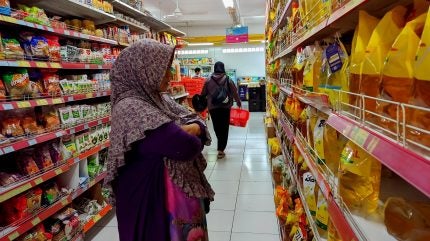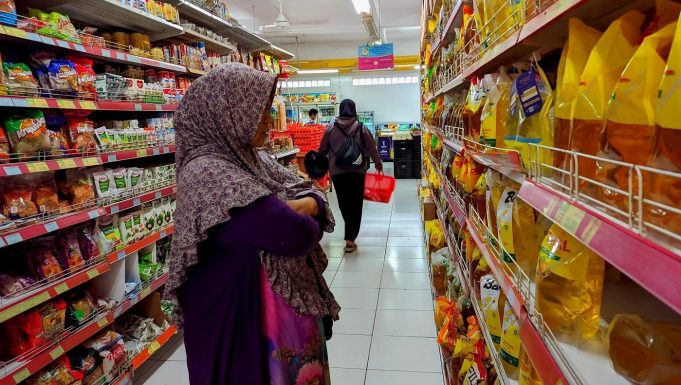
Indonesia’s food and drinks industry is pushing for a delay of a new system of nutrition labels, warning the regulations could have economic repercussions if rushed.
A set of new rules on health include measures aimed at controlling sugar, salt and fat content in processed foods as part of efforts to reduce non-communicable diseases.
Indonesia’s National Agency of Drug and Food Control (BPOM) has released a draft of its Nutri-Level labelling regime to classify food products into four categories – A, B, C, and D – based on their levels of sugar, salt and fat.
Under the agency’s plans, the labels would be used on most packaged food and drink products sold in Indonesia. The labels would be phased in, with ready-to-drink beverages, including liquid concentrates and powdered drinks, being covered first, expected within 18 months of the final approval of the regulations.
Other processed food categories will be included in subsequent stages, except for certain exempted areas such as coffee, tea and spices.
Small and micro businesses will be given more time to comply.
Access the most comprehensive Company Profiles
on the market, powered by GlobalData. Save hours of research. Gain competitive edge.
View profiles in store

Company Profile – free
sample
Your download email will arrive shortly
We are confident about the
unique
quality of our Company Profiles. However, we want you to make the most
beneficial
decision for your business, so we offer a free sample that you can download by
submitting the below form
By GlobalData
Country *
UK
USA
Afghanistan
Åland Islands
Albania
Algeria
American Samoa
Andorra
Angola
Anguilla
Antarctica
Antigua and Barbuda
Argentina
Armenia
Aruba
Australia
Austria
Azerbaijan
Bahamas
Bahrain
Bangladesh
Barbados
Belarus
Belgium
Belize
Benin
Bermuda
Bhutan
Bolivia
Bonaire, Sint
Eustatius
and
Saba
Bosnia and Herzegovina
Botswana
Bouvet Island
Brazil
British Indian Ocean
Territory
Brunei Darussalam
Bulgaria
Burkina Faso
Burundi
Cambodia
Cameroon
Canada
Cape Verde
Cayman Islands
Central African Republic
Chad
Chile
China
Christmas Island
Cocos Islands
Colombia
Comoros
Congo
Democratic Republic
of
the Congo
Cook Islands
Costa Rica
Côte d”Ivoire
Croatia
Cuba
Curaçao
Cyprus
Czech Republic
Denmark
Djibouti
Dominica
Dominican Republic
Ecuador
Egypt
El Salvador
Equatorial Guinea
Eritrea
Estonia
Ethiopia
Falkland Islands
Faroe Islands
Fiji
Finland
France
French Guiana
French Polynesia
French Southern
Territories
Gabon
Gambia
Georgia
Germany
Ghana
Gibraltar
Greece
Greenland
Grenada
Guadeloupe
Guam
Guatemala
Guernsey
Guinea
Guinea-Bissau
Guyana
Haiti
Heard Island and
McDonald
Islands
Holy See
Honduras
Hong Kong
Hungary
Iceland
India
Indonesia
Iran
Iraq
Ireland
Isle of Man
Israel
Italy
Jamaica
Japan
Jersey
Jordan
Kazakhstan
Kenya
Kiribati
North Korea
South Korea
Kuwait
Kyrgyzstan
Lao
Latvia
Lebanon
Lesotho
Liberia
Libyan Arab Jamahiriya
Liechtenstein
Lithuania
Luxembourg
Macao
Macedonia,
The
Former
Yugoslav Republic of
Madagascar
Malawi
Malaysia
Maldives
Mali
Malta
Marshall Islands
Martinique
Mauritania
Mauritius
Mayotte
Mexico
Micronesia
Moldova
Monaco
Mongolia
Montenegro
Montserrat
Morocco
Mozambique
Myanmar
Namibia
Nauru
Nepal
Netherlands
New Caledonia
New Zealand
Nicaragua
Niger
Nigeria
Niue
Norfolk Island
Northern Mariana Islands
Norway
Oman
Pakistan
Palau
Palestinian Territory
Panama
Papua New Guinea
Paraguay
Peru
Philippines
Pitcairn
Poland
Portugal
Puerto Rico
Qatar
Réunion
Romania
Russian Federation
Rwanda
Saint
Helena,
Ascension and Tristan da Cunha
Saint Kitts and Nevis
Saint Lucia
Saint Pierre and Miquelon
Saint Vincent and
The
Grenadines
Samoa
San Marino
Sao Tome and Principe
Saudi Arabia
Senegal
Serbia
Seychelles
Sierra Leone
Singapore
Slovakia
Slovenia
Solomon Islands
Somalia
South Africa
South
Georgia
and The South
Sandwich Islands
Spain
Sri Lanka
Sudan
Suriname
Svalbard and Jan Mayen
Swaziland
Sweden
Switzerland
Syrian Arab Republic
Taiwan
Tajikistan
Tanzania
Thailand
Timor-Leste
Togo
Tokelau
Tonga
Trinidad and Tobago
Tunisia
Turkey
Turkmenistan
Turks and Caicos Islands
Tuvalu
Uganda
Ukraine
United Arab Emirates
US Minor Outlying Islands
Uruguay
Uzbekistan
Vanuatu
Venezuela
Vietnam
British Virgin Islands
US Virgin Islands
Wallis and Futuna
Western Sahara
Yemen
Zambia
Zimbabwe
Kosovo
Industry *
Academia & Education
Aerospace, Defense &
Security
Agriculture
Asset Management
Automotive
Banking & Payments
Chemicals
Construction
Consumer
Foodservice
Government, trade bodies
and NGOs
Health & Fitness
Hospitals & Healthcare
HR, Staffing &
Recruitment
Insurance
Investment Banking
Legal Services
Management Consulting
Marketing & Advertising
Media & Publishing
Medical Devices
Mining
Oil & Gas
Packaging
Pharmaceuticals
Power & Utilities
Private Equity
Real Estate
Retail
Sport
Technology
Telecom
Transportation &
Logistics
Travel, Tourism &
Hospitality
Venture Capital
Tick here to opt out of curated industry news, reports, and event updates from Just Food.
Submit and
download
Visit our Privacy Policy for more information about our services, how we may use, process and share your personal data, including information of your rights in respect of your personal data and how you can unsubscribe from future marketing communications. Our services are intended for corporate subscribers and you warrant that the email address submitted is your corporate email address.
Triyono Prijosoesilo, the chairman of the Association of Indonesian Soft Drink Producers (ASRIM), urged the government to consider further postponing implementation. “We feel that the industry has been minimally involved in this process,” Triyono told Just Food, adding BPOM had held limited consultations with industry.
“There are many questions about the criteria for each category. What exactly do A, B, C, and D actually mean, and why were these thresholds chosen? The lack of explanation has led to uncertainty.”
Triyono stressed ASRIM is also concerned label redesigns would inflate production costs. He said companies seeking a better rating would need time to transition to healthier products, stressing that consumer acceptance is crucial if recipes are changed.
Singapore consulted for ten years before introducing its similar Nutri-Grade system in 2021 “to build consumer awareness, even starting in schools”, he said.
BPOM chairman Taruna Ikrar has insisted the agency is still gathering feedback from companies and consumers.
“The draft regulation has been completed, and we are moving forward with the public consultation process,” he told a news conference late last month.
“We want to ensure the public and industry are well-informed before we make any final decisions.”
The BPOM is mapping the upper and lower food nutrition limits for Nutri-Level standards, he said.
“Our priority is to synchronise the criteria for each level – what constitutes an A, B, and so on. We are also negotiating the grace period for implementation.”
The Indonesian Food and Beverage Producers Association (GAPMMI) has also warned about the potential implications for the industry and the broader economy.
“We hope the government will consider postponing this regulation and work on developing a comprehensive roadmap with stakeholders, including food technology and nutrition experts,” said GAPMMI chairman Adhi Lukman.
“The consequences could be severe, from lost business opportunities to lost livelihoods. The cost to the nation would be too high.”
Under the draft rules, Level A, marked in green, represents the healthiest choice, with the lowest levels of sugar, sodium and fat. Level D – red – represents the highest levels of these ingredients.
Nutri-Level labels will be prominently displayed on the front of food labels, with the specific amounts of sugar, salt and fat noted per serving or per package.
Taruna said the BPOM is assessing the impact of the new labelling system on businesses and exploring potential incentives to support companies.
“Reformulation efforts and other changes will have a significant impact on businesses, so we are taking that into account,” he added.






